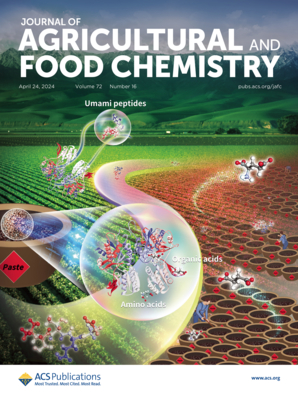Canolol Alleviates Ethanol-Induced Gastric Ulcer by Inhibiting p38 MAPK/NF-κB/NLRP3 Pathway
IF 6.2
1区 农林科学
Q1 AGRICULTURE, MULTIDISCIPLINARY
引用次数: 0
Abstract
Gastric ulcer (GU) is among the most prevalent digestive disorders globally. This study investigates the protective effects of canolol, a natural phenolic compound derived from crude rapeseed oil, on ethanol-induced GU in rats. Our results demonstrated that canolol pretreatment notably reduced gastric mucosal damage, as evidenced by lower ulcer indices and improved histopathological scores. Ethanol exposure severely disrupted the gastric mucosal defense systems, characterized by reduced gastric wall mucus secretion, lower NP-SH levels, suppressed heat shock protein 70 expression, and decreased gastric mucosal blood flow; however, these effects were counteracted by canolol pretreatment. Canolol also alleviated ethanol-induced inflammation by reducing the levels of pro-inflammatory cytokines (TNF-α, IL-1β, and IL-6), enhancing the level of the anti-inflammatory cytokine (IL-10), and normalizing myeloperoxidase activity in the gastric mucosa. Additionally, canolol enhanced antioxidant defenses by increasing the activities of antioxidant enzymes (SOD, CAT, and GPx) and the GSH level, thereby mitigating ethanol-induced oxidative stress in the stomach. Moreover, canolol suppressed ethanol-induced apoptosis in the gastric mucosa, evidenced by a decrease in TUNEL-positive areas and downregulation of the expression of apoptotic markers BAX and caspase-3. Mechanistically, canolol substantially reduced the activities of p38 MAPK and NF-κB, consequently preventing NLRP3 activation. These findings indicate that canolol has potential benefits in preventing the onset and progression of ethanol-induced GU by inhibiting the p38 MAPK/NF-κB/NLRP3 pathway.

甘油三酯通过抑制p38 MAPK/NF-κB/NLRP3通路缓解乙醇性胃溃疡
胃溃疡是全球最常见的消化系统疾病之一。本研究探讨了菜籽油中提取的天然酚类化合物菜籽醇对乙醇诱导大鼠谷氨酸的保护作用。我们的研究结果表明,卡诺洛尔预处理显著减轻了胃粘膜损伤,溃疡指数降低,组织病理学评分提高。乙醇暴露严重破坏胃黏膜防御系统,表现为胃壁粘液分泌减少,NP-SH水平降低,热休克蛋白70表达抑制,胃黏膜血流量减少;然而,这些作用被卡诺洛尔预处理所抵消。Canolol还通过降低促炎细胞因子(TNF-α, IL-1β和IL-6)水平,提高抗炎细胞因子(IL-10)水平,并使胃粘膜髓过氧化物酶活性正常化来减轻乙醇诱导的炎症。此外,油菜酚通过提高抗氧化酶(SOD、CAT和GPx)的活性和GSH水平来增强抗氧化防御能力,从而减轻乙醇诱导的胃氧化应激。此外,菜籽醇还能抑制乙醇诱导的胃黏膜细胞凋亡,其表现为tunel阳性区域减少,凋亡标志物BAX和caspase-3表达下调。在机制上,canolol显著降低了p38 MAPK和NF-κB的活性,从而阻止了NLRP3的激活。这些发现表明,油菜酚通过抑制p38 MAPK/NF-κB/NLRP3通路,在预防乙醇诱导的GU的发生和进展方面具有潜在的益处。
本文章由计算机程序翻译,如有差异,请以英文原文为准。
求助全文
约1分钟内获得全文
求助全文
来源期刊
CiteScore
9.90
自引率
8.20%
发文量
1375
审稿时长
2.3 months
期刊介绍:
The Journal of Agricultural and Food Chemistry publishes high-quality, cutting edge original research representing complete studies and research advances dealing with the chemistry and biochemistry of agriculture and food. The Journal also encourages papers with chemistry and/or biochemistry as a major component combined with biological/sensory/nutritional/toxicological evaluation related to agriculture and/or food.

 求助内容:
求助内容: 应助结果提醒方式:
应助结果提醒方式:


